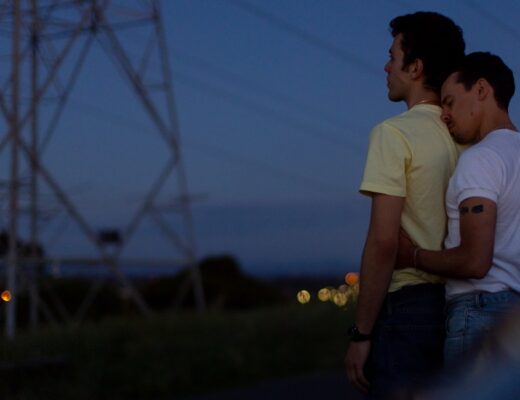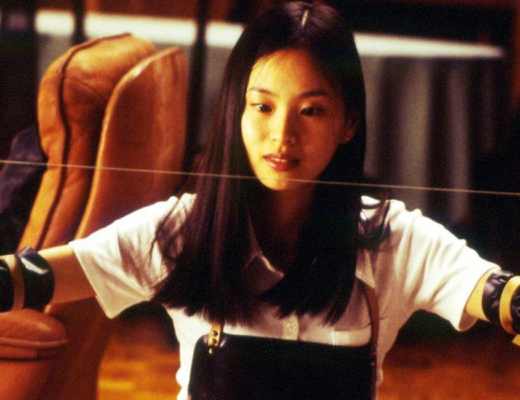Jonathan Rosenbaum once wrote that the lasting legacy of Star Wars, that quintessential Hollywood popcorn movie, was that it conditioned audiences to process mass death and destruction as a mere special effect. That’s certainly how some folks processed the annihilation of the World Trade Center, a real event experienced live by most of America through the filtered feed of a television set. “It looked just like a movie” was the overheard refrain of the shell-shocked public, for whom the sight of a towering inferno proved instantly reminiscent of any number of disaster porn spectacles, those big-budget snuff films of the Event Movie era. In a sense, George Lucas is the father of this apocalyptic genre, though I doubt he could have really anticipated the dehumanizing duties his technological innovations would later be put to. Like cinema’s answer to Robert Oppenheimer, he could do nothing but watch as cities were leveled and havoc was wreaked, all thanks to the state-of-the-art techniques he pioneered. Lucas sought to create new worlds. His disciples and descendants, those perverse purveyors of Dolby Digital destruction, just wanted to blow up old ones.
Among Hollywood’s harbingers of doom, for whom “movie magic” equates to bigger, louder, and more detailed panoramas of global catastrophe, who has made a prettier penny peddling his extermination fetish than Roland Emmerich? The German-born filmmaker, director of such blustery blockbusters as Independence Day and Godzilla, has spent more than a decade treating our great metropolises like the sites of his own personal demolition derbies. His are the pictures that people were evoking on 9/11, the big-bang spectacles that desensitized psyches defaulted to. Life seemed to be imitating art on that gray Tuesday morning. Emmerich’s latest End of Days exercise finds art imitating life again — and the results are so appallingly callous, so irresponsibly misjudged, that even the most jaded of action movie aficionados may be taken aback by it. In 2012, a summer movie stranded in the chilly outskirts of the Holiday Season, Jackson Curtis (John Cusack) navigates his estranged family — including ex-wife Kate (Amanda Peet), her new husband Gordon (Thomas McCarthy), and pre-adolescent kids Noah (Liam James) and Lily (Morgan Lily) — across the swelling, splintering cityscape of Los Angeles. Behind them, the earth churns and spikes in seismic waves, bunching up like a malevolent accordion, destroying everything in its fiery wake.
As Jackson and his kin narrowly evade the impending apocalypse, eventually switching from car to private jet, details of the carnage below come into sharper focus. We see little CGI people leaping futilely from the open windows of collapsing buildings, or, in the blink of an eye, simply evaporating in the burgeoning hellfire. This brief but very deliberate evocation of 9/11 registers as an almost subliminal plea for real-world parallel — Cloverfield looks respectful by comparison — and Emmerich otherwise stages the fabled Big One like he does all of his trailer-ready setpieces: as a cavalcade of noisy, busy, spatially-inconsistent effects. Billions upon billions of people perish in 2012, most of them off screen. In an Emmerich movie, if you’re not one of the maybe dozen characters that have been “fleshed out” for strictly narrative reasons, don’t expect so much as a few frames devoted to your horrible, horrible demise. You’ll either be a blip of a special effect, consumed by some raging maelstrom, or your death will be exploited for a cruel punchline. (Here we get a pair of elderly motorists, oblivious to the massive earthquake happening around them, obliterated by a jagged jut of rock that suddenly appears in their path.) If you’re not an American, your ghastly end will be a footnote, an ancillary mention in some line of expository dialogue. (You may, however, get a “before” or “after” moment, like the spear-pumping African natives in ID4 or the Chinese monks here, solemnly awaiting their doom.) Oh, and if you’re a dog, have no fear: not only will you survive Judgment Day, you’ll get a substantially larger chunk of screen time than some of your bi-pedal co-stars. To Roland Emmerich, life is cheap, genocide is a plot catalyst, and the fate of the human race is secondary to the familial reconciliation of a handful of (mostly) white men.
2012 feels like a summative effort, what an auteur theorist might call an “encapsulation” of all the filmmaker’s narrative and thematic concerns. Which is a polite way of saying, of course, that Roland is stuffing all his bad habits into one big, bloated picture. He’s essentially been remaking the same movie for years now, subbing a different global threat — aliens, radioactive monsters, Mother Nature — into the same old disaster epic template. At a whopping 158 minutes, 2012 stretches that formula to its absolute breaking point. Encompassing roughly an hour of the mammoth runtime (!), the ominous prelude portion of the show commences when an intrepid geologist (Chiwetel Ejiofor, gamely grappling with the inanity of his “scientific” dialogue) discovers that the Mayans were right all along and that thanks to a barrage of solar flares, the world will go kablooey on December 21st of that titular year. While world leaders scramble to prepare for the coming onslaught, Cusack’s struggling sci-fi scribe — Will Smith everyman to Ejiofor’s Jeff Goldblum brainiac — tries to reconnect with his wife and kids. Fortunately for him, there’s nothing like the utter annihilation of your neighborhood to bring a family back together again. After introducing its various ensemble players and dispensing with the endless exposition, 2012 gets down to business, delivering on the cataclysmic promise of its premise. Yellowstone blows its top, transforming into the biggest active volcano since, well, Volcano. A giant ocean liner capsizes, joining the Titanic and the Poseidon in the murky depths of the great blue sea. Deep Impact-sized tsunamis submerge coastal cities, and an ice age cold front straight out of The Day After Tomorrow blows over the Eastern Hemisphere.
Emmerich stages these Extinction Level Events with a kind of joyless and perfunctory craftsmanship. Hell, he scarcely bothers to vary their specifics — not once, not twice, but three times do Cusack and family escape some epic natural disaster by way of car and then plane. There’s none of the endearing silliness of the director’s previous hits — no one outruns deadly frost in this one, for example — nor does the film possess an arresting comic presence, a la Will Smith. Emmerich does pack the picture frame to frame with paycheck-cashing talent: Woody Harrelson froths at the mouth as the film’s crackpot, radio D.J. prophet, while Danny Glover’s somber, sorrowful Commander in Chief furrows his brow. (“Obama,” someone whispered in my theater, which I suppose is the intended response.) There are a few lip-smacking villains, too, including a Russian billionaire (Zlatko Buric) and a bastard Republican (Oliver Platt) who says “doctor” with such a sarcastic sneer that the “Mr. Scientist” gag in South Park immediately comes to mind. Emmerich burns at least a reel on the conflict between Platt’s pragmatic (RE: heartless) politician and Ejiofor’s bleeding heart humanist, with the latter raising horrified objection to the pay-to-play lottery system being enacted by the world leaders. (Mere lip-service, this cynical plot point, as we’re still ultimately being asked to root for the survival of the world’s wealthiest people, and them alone.) Meanwhile, Cusack and co. make their way across the smoldering remains of the planet, with nary a single prayer offered, a single remorseful remark uttered, in honor of the dead and dying. Suppose there’s enough disingenuous hand-wringing going on elsewhere — it’s hard to take Emmerich’s monologues about love and togetherness seriously when he takes such glee in orchestrating grand-scale holocausts.
Not to mention, of course, the childish delight he takes in obliterating man’s greatest achievements, here epitomized by the mighty crack that rips through the Sistine Chapel (right where Adam and God almost touch, natch) or the moment where our “heroes” giggle as they clip off the top of the Eiffel Tower. That last little touch, a snide sight gag in the middle of the goddamn Rapture, recalls Michael Bay’s decision to nuke all of Paris in a single shot in Armageddon. They’re kindred spirits these two, rotten to their respective, money-grubbing cores. Increasingly, both Emmerich and Bay have been modeling their nihilistic crowd-pleasers after the sturdy Big Picture handiwork of that other blockbuster godfather, Steven Spielberg. “We’re gonna need a bigger plane,” remarks Cusack halfway into 2012, a sly acknowledgement that the modern disaster flick owes more to Jaws than it does to, say, Airport. And yet, Spielberg’s own end of the world epic, the unfairly maligned War of the Worlds, reverberates with a horror and a sadness that a merchant of misery like Roland Emmerich wouldn’t know what to do with. Think of Tom Cruise, stumbling back into his home, his face and body caked with the ashen remains of his vaporized neighbors. And then think of 2012, which ends with a bunch of billionaires stepping out into brilliant daylight, setting sale for deserted Africa, ready to inherit the empty Earth. This is a utopian rebirth that only a filthy rich fabulist could dream up, and it’s the perfect ending to the year’s most sick and soulless Hollywood entertainment.







